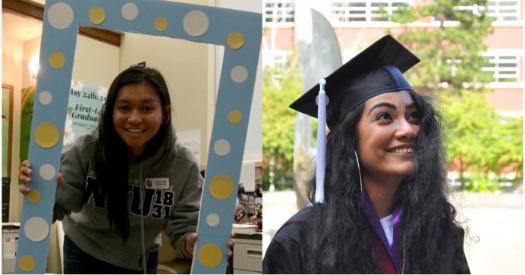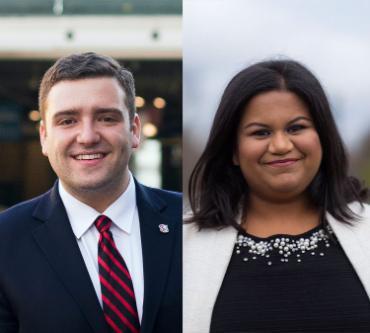 Everyone should have access to higher education. Yet, systemic barriers continue to impede many college hopefuls, including first-generation students whose parents or guardians have not received a U.S. bachelor’s degree. Seattle University is committed to empowering first-gen students and providing them with the tools to succeed. Chhavi Mehra, ’20, and Jessica Olarti, ’20, are recent first-gen graduates who, with the help of an SU education, are breaking barriers and leading our alumni community towards a more just and humane world.
Everyone should have access to higher education. Yet, systemic barriers continue to impede many college hopefuls, including first-generation students whose parents or guardians have not received a U.S. bachelor’s degree. Seattle University is committed to empowering first-gen students and providing them with the tools to succeed. Chhavi Mehra, ’20, and Jessica Olarti, ’20, are recent first-gen graduates who, with the help of an SU education, are breaking barriers and leading our alumni community towards a more just and humane world.
When Jessica Olarti entered Seattle U as a freshman, her parents felt like she was finally on a clear-cut path towards a stable career. “A lot of first-generation students have parents that think that getting a college degree is the door to all of these job opportunities,” says Olarti. “They consider it success and the first step out of that cycle of having to work in unstable jobs.”
However, she soon realized that navigating college and gaining work experience is far from clear-cut. It’s a challenging journey—especially for first-gen students. Olarti noticed that she lacked much of the terminology that other students understood. However, with the help of the Outreach Center, Olarti was able to find the answers she needed to excel. “I lived in the Outreach Center. I worked there, and even on days when I wasn’t working, I went there a lot of times to ask for advice from my ‘big brothers and sisters’ on campus,” says Olarti.
For Chhavi Mehra, the process of coming to America for higher education was far from easy. She grew up in India, and while she was excited by the prospect of coming to America, she also struggled with the prospect of leaving her family. She knew that she needed scholarships to afford college due to the high cost of education in the U.S. Despite these barriers, Mehra persisted. “The society I come from is very patriarchal. I can’t imagine going back home and seeing myself married, having kids and starting a family without really going after my dreams,” says Mehra. “And that’s what my mom wanted for me—she wanted me to have the choice to create the life I really wanted for myself.”
After first getting her Associate of Arts in Communication and Media Studies from South Seattle College, Mehra applied to Seattle U. She was excited to be awarded both the Messina Scholarship for transfer students and be a part of the Alfie Scholarship Program. “I was so grateful for these scholarships. They really helped in making my decision to go to Seattle University, because if those scholarships didn’t exist, I wouldn’t have been able to afford my university education. I’m really grateful for that.”
At Seattle U, both Olarti and Mehra were drawn to SU’s focus on social justice.
“I graduated from Albers, so I learned how the world works economically, and because of SU I also learned about social justice issues. I understand the world through different perspectives. It helps me both professionally and socially,” says Olarti.
For Mehra’s capstone project, she worked to create the Project First-Gen podcast, where she interviewed first-gen students and professors at SU and beyond. “Social justice was at the heart of each of my projects at Seattle U, as well as personally and professionally,” says Mehra. “With Project First-Gen, we were able to empower others while also empowering ourselves. It gave people a platform to shine in their own unique way. And for that, it focused on underrepresented populations, namely students of color and first-gen students.”
Both Olarti and Mehra are 2020 graduates. Using the skills and values they honed at Seattle U, they are emerging as leaders for a better future. Once Olarti completes the required course work for her CPA she will be work at the BDO accounting firm. “This is a stable career path that I decided to pursue. Had I not gone to college, I wouldn’t have had this opportunity. There's power in knowledge and if someone like me can learn all of these things, then I can give that knowledge to my family and to other people who don’t have the resources that I did.” Mehra is currently working three jobs, including working as an editorial intern for The Borgen Project – a Seattle-based nonprofit that works to fight global poverty. “Again,” says Mehra, “social justice is at the heart of my mission.”
In late October, we will be sending a special Building Legacy Celebration message to first-generation and legacy students recognizing their commitment to education at Seattle University. Whether a student is following in the footsteps of those before them or paving the way for future members of their community to follow, we want to honor and celebrate their dedication to an education of both thought and action. We also invite you to join us in recognizing first-gen students on November 8 as part of First-Generation Celebration Day.

